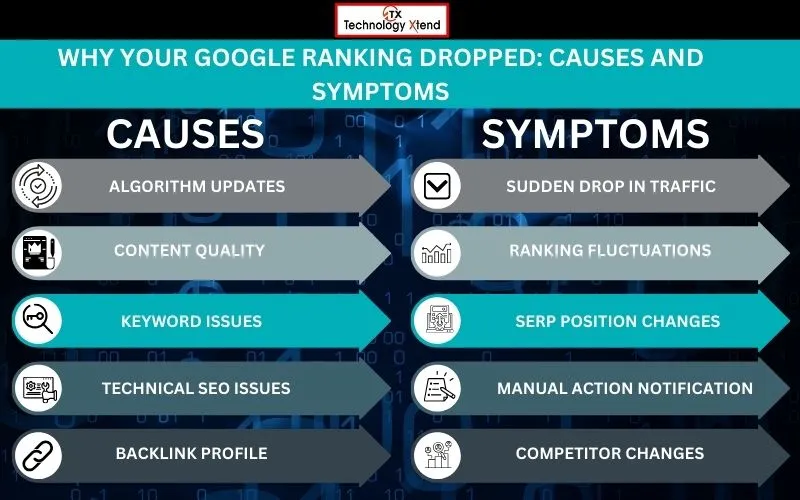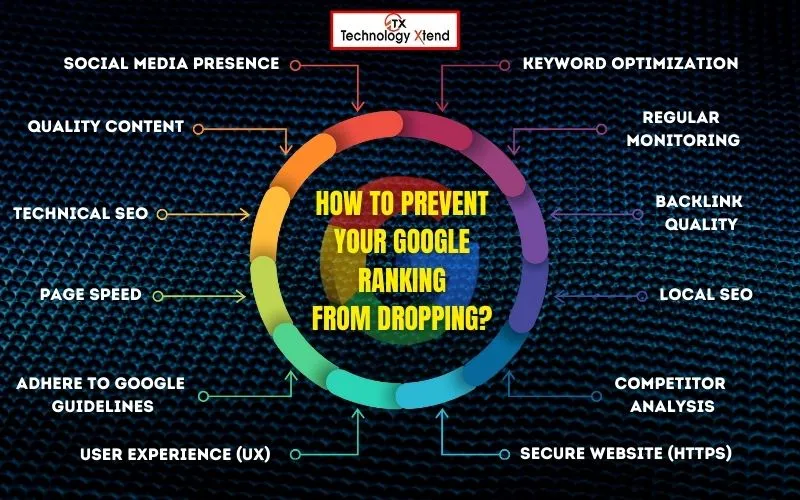
Technology XtendReasons for Google Ranking Decline and How to Recover It
Every website owner’s worst nightmare is losing visibility on search engines. It means loss of traffic, leads, customers and ultimately revenue. Google rankings are a cornerstone of online visibility, and sudden drops can be detrimental to businesses of all sizes. In this article, we will explore the various reasons why Google rankings might drop suddenly, how to identify if it is affecting your website, and what you can do to improve your rankings.
Understanding Google ranking drops: Causes and Symptoms
Ranking on the first page of Google search results is a crucial driver of traffic and revenue for websites. A high ranking indicates that the website provides high-quality content that searchers are interested in. Over 35% of all clicks go to the top three search results, and once people land on a website, they are more likely to trust it if it ranks high.

» Common reasons for a sudden drop in Google rankings
There are various reasons why a website’s ranking might drop suddenly. Some of the most common ones include algorithm updates and penalties, technical issues, lack of quality content, and keyword stuffing. Algorithm updates deploy machine learning models to refine search results and enhance user experience while penalties are manual actions taken against websites that violate Google’s quality guidelines. Here are some common reasons and possible solutions:
1. Algorithm updates: Google frequently updates its algorithms to improve search results. If your website's ranking has dropped after a major update, then you may need to make changes to your website's content or structure to meet the new requirements. Check Google's Webmaster Central Blog for news about algorithm updates and tips on how to stay on top of them.
2. Technical issues: Technical issues such as broken links, slow page loading times, or mobile responsiveness can negatively impact your website's ranking. Use tools like Google's PageSpeed Insights or GTmetrix to identify and fix technical issues on your website.
3. Low-quality content: If your website's content is low-quality, duplicate, or irrelevant, it may not rank well in search results. Ensure that your content is unique, engaging, and informative. Use keyword research tools to identify relevant keywords and incorporate them into your content.
4. Backlink profile: Backlinks are important signals that indicate the quality and relevance of your website. If your website has a poor backlink profile, it may not rank well. Use tools like Ahrefs or Moz to identify and disavow low-quality or spammy backlinks.
5. Manual penalties: If Google has manually penalized your website for violating its guidelines, you may need to fix the issues and submit a reconsideration request to Google.
To fix your website's Google ranking, you need to identify the root cause of the problem and take appropriate actions. In most cases, improving the quality and relevance of your website's content, fixing technical issues, and building a strong backlink profile can help you regain lost rankings.
For an elaborate strategy on Important SEO Tips For Beginners click on linked article
Analyzing your website for ranking drops
» Tools and metrics for website analysis
Determining the cause of a ranking drop requires analyzing the website using different tools, among them being Google Analytics, Google’s Search Console and Marketing Miner. These tools offer insights into website traffic, click-through rates (CTR), keyword ranking, and backlinks. Google’s search console provides detailed information on backlinks and organic search traffic to aid in resolving ranking drops.
» Identifying areas for improvement
After analyzing the website, certain areas identified for improvement may include identifying duplicate content, improving metadata, technical site optimizations, improving navigation, and creating fresh and quality content. Let’s get in depth to understand more about these:
1. Identifying duplicate content: Duplicate content can harm a website's search engine rankings. By using tools like Copyscape or Siteliner, you can identify and eliminate duplicate content. Focus on creating unique and original content for each page.
2. Improving metadata: Metadata, such as title tags and meta descriptions, plays a crucial role in search engine optimization (SEO). Ensure that each page has unique and relevant metadata, including targeted keywords, to enhance its visibility in search results.
3. Technical site optimizations: Technical optimizations aim to improve website performance, speed, and accessibility. This includes optimizing image sizes, minifying CSS and JavaScript files, enabling browser caching, using a content delivery network (CDN), and ensuring mobile responsiveness. Conduct a website audit to identify and address technical issues.
4. Improving navigation: User-friendly navigation enhances the overall user experience. Analyze your website's navigation structure and ensure its intuitive and easy to use. Use descriptive menu labels, hierarchical organization, and breadcrumb navigation to guide users and search engines through your site effectively.
5. Creating fresh and quality content: High-quality, engaging, and up-to-date content is essential for both users and search engines. Regularly publish fresh content that aligns with your audience's interests and incorporates relevant keywords. Use a mix of text, images, videos, and other media formats to make your content more appealing.
Common reasons for a sudden drop in Google rankings
By optimizing your website for mobile, you can improve the user experience for mobile users and improve your website's rankings in 2023.
» Algorithm updates and penalties
Google continually updates their algorithms to optimize search results. These tweaks can cause a drop or increase in website rankings. Websites that do not follow Google’s guidelines are penalized, hindering their visibility on their search engine. Common penalties include the Google Medic update which targeted most sites related to health and wellness like pharmaceuticals and health blogs. Fred penalizes websites with low-quality content and poor user experience.
» Algorithm updates and penalties
Technical issues affecting websites such as slow page load times, broken links, and website errors drastically affect rankings. Slow page load times may disappoint visitors, which leads to lower dwell times, increasing bounce rates, and negatively affecting rankings. Broken links on websites inhibit the smooth movement of search engine crawler robots and negatively impact rankings. It is important for business owners to ensure their website is regularly audited for technical issues to maintain high rankings.
» Quality content and keyword stuffing
Quality content plays a significant role in ranking high on Google. That is why different aspects of content optimization such as mobile optimization, writing SEO optimized titles, internal link structure and updating content regularly should not be overlooked as they contribute to the website's authority and relevance. Keyword stuffing is the incorporation of keyword phrases and synonyms excessively throughout the content, guaranteeing a penalty from Google. Good content should be written for users in mind.
Also Read :- How To Optimize Your Website For Search Engines
Fixing your website's Google ranking drops: Step-by-step guide
» Addressing technical issues
In fixing website technical issues, the webmaster should first identify a bad backlink profile, increase website speed, and regularly audit and fix broken pages. Improving content and keyword optimization also significantly influences ranking. Finally, attending to user experience issues on both desktop and mobile platforms guarantees fast and easy website navigation, which increases user dwell times and reduces bounce rate.
» Improving content quality and keyword usage
To improve your content, you should target keywords that attract high-quality traffic. With the help of tools such as Google Keyword Planner, website owners can identify high traffic keywords related to their products or services. In creating valuable content, the webmaster should ensure that their content is better than the top-ranking pages of that keyword in SERP. Besides, optimizing the content to be easily readable for users has a direct impact on reducing bounce rates.

» Building high-quality backlinks
Having high quality and relevant backlinks signals Google that a website is authoritative and has high-quality content. In building high-quality backlinks, website owners can contribute to high-quality blogs, submit articles to press release sites, and request that people link to their website, among other techniques.
Conclusion
Google ranking drops can be detrimental to the online visibility of websites, leading to loss of potential revenue. Google penalizes websites that violate their quality guidelines, so it is important to maintain a good reputation. Understanding the various causes of ranking drops is one step towards improving your website’s visibility. Analyzing the website’s performance, fixing technical issues, and improving content quality and keyword usage also guarantee fast and long-lasting improvements to website rankings.
»Closing thoughts
To maintain a strong online presence, website owners must regularly audit their websites and stay updated on Google's algorithms. These act as a roadmap towards retaining website rankings and improving online visibility.
Related Articles










































